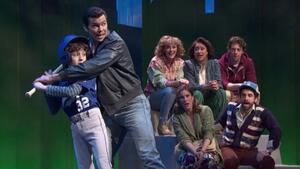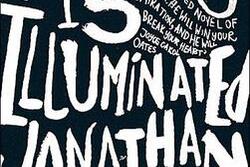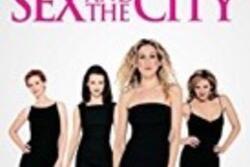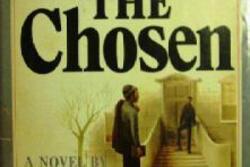L’dor Vador in Falsettoland
I walked into a dark Walter Kerr Theater. I didn’t know much about the show, but I knew Andrew Rannells was in it, which, I’m sure we can all agree, is a good enough reason to see any show. The band warmed up and the lights dimmed. Then, three men and a little boy walked on stage dressed as “Biblical Hebrews” singing, “Four Jews in a Room Bitching.” I’ve never felt more at home.
This show is Falsettos, a revival of the 1990’s opera set in the height of the AIDS crisis. The show covers a few years in the lives of a super dysfunctional family. The main character, Marvin, is a sloppy man who leaves his wife, Trina, and son, Jason, for his best friend and lover, Whizzer. However, despite the complexity of the situation, Marvin still expects everyone to sit together, play “happy family,” and have dinner. Then, Trina starts seeing Marvin’s psychiatrist and she falls in love with him. Eventually, they get married. Awkward! But actually, the awkwardness is what gives this play so much of its charm. The characters act like real people rather than polished dramatists, making the show much more relatable. The play ends with Whizzer’s death due to a mysterious cancer-like illness that’s ultimately revealed to be AIDS.
Although you probably wouldn’t guess it from the synopsis, Falsettos is an extremely Jewish play. The first song, “Four Jews in a Room Bitching,” pays homage to Jewish self-deprecating humor and celebrates the Jewish neuroticism stereotype. It’s a classic over the top Mel Brooks-esque number. But the opening is somewhat misleading. If someone watched the first act of Falsettos without the opening number, they would probably think the show was about an ethnically generic, white, middle class family in the late 70s. None of the characters, with the exception of Mendel Weisenbachfeld, are overtly Jewish. It might not sound like a good thing, but to me this is one of the greatest things about the show. I appreciate that it has Jewish elements, but that these elements aren’t over the top, and don’t play off of common stereotypes about Jews.
The overall “jewy-ness” of the show really starts in the second act. Set two years later, Jason is now thirteen and ready to become a Bar Mitzvah. But as Whizzer slowly gets sicker and sicker, Jason doesn’t want to do it anymore, not without Whizzer. Jason is the youngest, but the wisest of all the characters. He understands, better than his parents, what the true meaning of Judaism and having a Bar Mitzvah ceremony is. It isn’t about a fancy party, or showing off for girls, or making a lot of money and getting presents. It’s about being with the people you love and sharing an important moment in your life. Without Whizzer, Jason doesn’t feel like his bar Mitzvah will be complete.
This play teaches its audience a lot about Judaism without being a show about Judaism. The show is about a dysfunctional family that just happens to be Jewish, allowing their religion to be something that guides and gives them courage in the story, rather than being the story. At its core, the show is about l’dor vador, making connections between generations. The characters show us that we learn a lot from the people we surround ourselves with, and that generational learning doesn’t just have to be down the family tree. Jason teaches his parents a lot about love, acceptance, and the relationship between faith and family. Family isn’t just the people you are related to or married to, but the people whom you love and who love you.
After I left the theater, I realized that I have never watched anything involving Judaism and felt prouder of the beauty in my religion afterwards. I also realized something I’d never thought of before: I am not proud of the way my religion is usually portrayed. It is upsetting to think that mainstream entertainment’s portrayal of Jews shapes most non-Jew’s ideas of what being a Jew is. The revival of Falsettos couldn’t have come at a better time. Anti-Semitism is rising in America, and all throughout the world, and Falsettos reminds us all, Jews and non-Jews, why Judaism is important. Our religion and our culture bring us together and hold us together. Falsettos reminds me why I am proud to be Jewish, and to be a part of all the Jews in rooms everywhere bitching.
This piece was written as part of JWA’s Rising Voices Fellowship.








Minnah, I love this piece and I love Falsettos! Thank you for beautifully articulating my exact feeling towards the show as a young Jewish woman.
Haha love the ending!